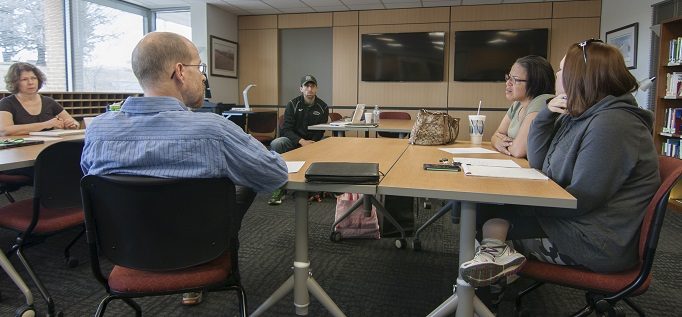Investing in the value of people
By Ed Finkel
June 8, 2021
Even as budgets strain, community colleges make professional development a priority.
Maryland’s Hagerstown Community College (HCC) moved to distance learning last spring while already midway through a learning management system transfer. The college has invested heavily in training around the technical elements of teaching online, says Linda Cornwell, coordinator of the Fletcher Faculty Development Center.
“That was absolutely necessary to help people understand that online is different from face-to-face,” she says. “It calls for a different approach to communicating, and organizing the course, and teaching the course. We have a lot of tools available for people to use. We’ve put a lot of focus on the learning management system itself, and how it’s different from the old system.”
The college was fortunate in garnering funds through the CARES Act to provide access to those tools, although HCC always had made online and hybrid teaching a professional development priority, Cornwell says.
However, many instructors hadn’t previously taught online. The college’s team, comprised of learning technology, learning management, instructional design and student support staff, have provided those faculty the skills they need. “There’s a steep learning curve,” she says. “We want to get [faculty] past that curve as quickly and as comfortably as we can.”
On the non-tech side, Cornwell already had been credentialed to facilitate the face-to-face version of the Quality Matters rubric and became certified to teach it online, which has provided the college a way to economize on professional development. “I would highly recommend that colleges invest in an in-house trainer who can help courses be better equipped to meet the needs of students,” she says.
Peer-to-peer workshops that the Fletcher Center has long coordinated at HCC have been moved online, as well, Cornwell says. “They’re thinking about combining elements more often to give flexibility to students,” she says. “We’re thinking about how we can offer faculty-led workshops to reach more people, including adjunct instructors who have a difficult time scheduling” in-person professional development.
Beyond the classroom
In addition to online teaching, HCC has worked to disseminate information about what the college is offering students during difficult economic and academic times so that faculty are in tune with students’ lives more broadly, ranging from students who have been laid off to those who are stressed out from working long hours at in-person jobs, Cornwell says.
“It’s to help faculty learn about what we offer to students—like a food pantry, or tutoring services—so they can communicate that,” she says. “Students are in a really different situation now than in any other time, with the practical implications of schools being closed, and the number of students dealing with their family members—children, siblings, parents sometimes—with everyone at home fighting for [computer] hardware, fighting for Internet bandwidth.”
All of that leads to questions like whether faculty should be giving students more leeway to turn assignments in late, Cornwell says. “There’s the technical tool and design side, and the human side,” she says. “How do you understand what’s going on with your students?”
Cornwell has seen greater interest from faculty in diversity-related topics due to the underlying social environment, and “we’ve had some fabulous guest speakers” on that front, she says. Others have asked for training on how to robustly serve as advisors for students. Still others have asked for training and support about the tenure process, and about course alignment and assessment.
“People really want to improve in that area, right down to the nitty-gritty of creating module objectives that align with course objectives,” she says.
Professional development also can help boost faculty morale, which in “normal” times can mean informal get-togethers for cookies and coffee at the Fletcher Center, Cornwell says. Now it takes the form of a “happy-ish hour” on Zoom to make connections and discuss pertinent topics. “That’s missing now [in person] because so few faculty are on campus, and so few courses are on campus,” she says. “We’re trying to create some of those opportunities online.” That helps garner feedback about what’s needed in terms of professional development, which Cornwell previously heard informally while walking around campus, she adds.
HCC doesn’t have a formal leadership professional development program, although Cornwell notes that certain divisions provide mentorship arrangements, at least informally, so the faculty can learn the entirety of their full-time role, which goes beyond teaching to include curriculum development, advising and career mentoring at some level.
“People who are thinking about leadership as faculty members probably would be thinking about the program coordinator role for a degree or certificate program,” she says. “That evolves naturally over time as they get past the assistant professor stage of their career. For some people, because we’re a very small community college, they’re the program coordinator from the start. They’re already in a leadership role.”
There’s more to the story! Read more about investing in professional development in the June/July issue of Community College Journal – coming soon.



